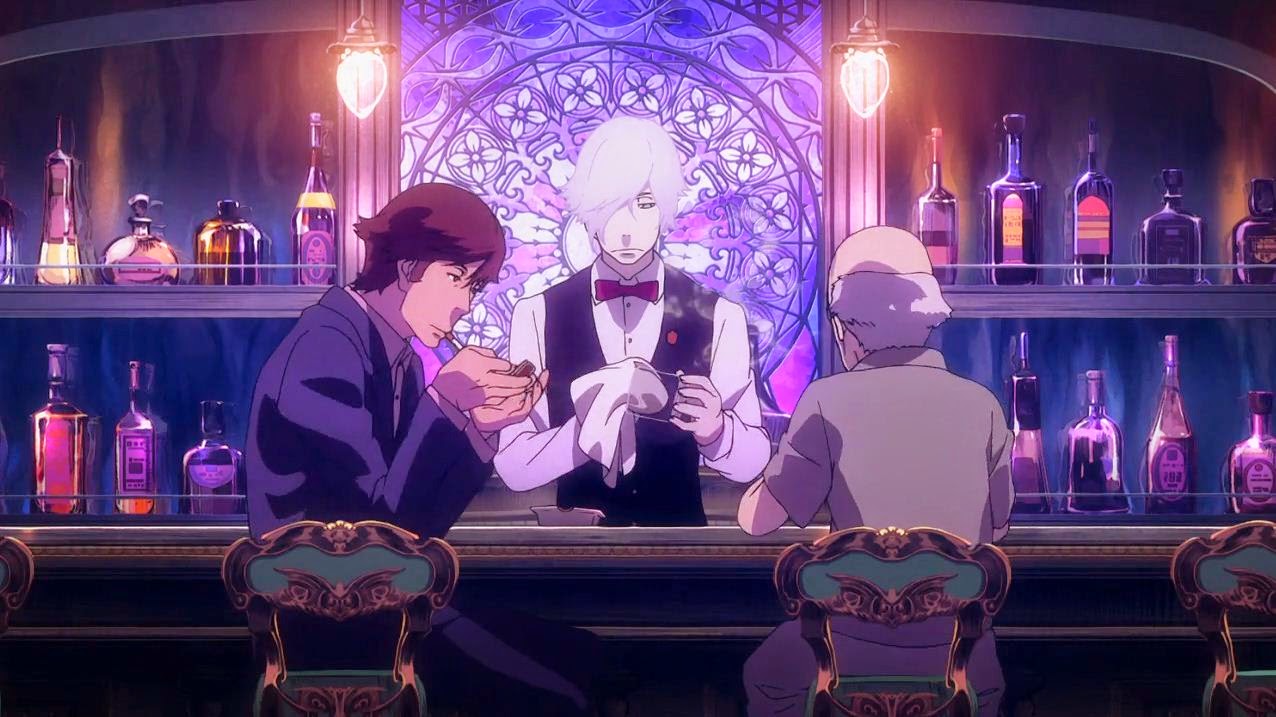Unlike the United States, Japan has a successful market for one-off animated shorts. These are called OVAs (Original Video Animation). Where the US relegates short animated films to festivals and online services, Japan often airs these specials on television or in conjunction with theatrical releases of longer animation. The shows don't always go to series afterwards and there is no expectation that they will.
The young and old contestants in the Death Billiards match meet at a beautiful bar, complete with stained glass windows, ornate furniture, and a handsome bartender in vest and bow-tie.
Sometimes, these films do get adapted into series. Death Billiards is one such example. This original OVA from Yuzuru Tachikawa was created through the Young Animator Training Project, a government-funded initiative to produce original work by young animators in Japan. This organization also funded Little Witch Academia (now two OVAs and a 12 episode series) and Music Girls (the full series begins airing July 8 in Japan). Death Billiards would become the much talked about Death Parade series.
For better or worse, the OVA plays out like a typical episode of the series. Two strangers arrive at a beautiful bar with no memory of how they got there and no way to leave. They are told by the bartender and the host that they have to randomly select a game to play against each other. They may not leave until the game is complete. They are also told the game has life or death stakes and are left to figure out the rest for themselves. In Death Billiards, a retiree and a young professional face off in a game of 8-ball.
The audience is meant to realize what is happening before the characters do. It is quite clear that the characters are in some kind of limbo, awaiting judgment on where they will end up in the afterlife. Death Billiards doesn't specify what the options are, and the English translation available defaults to desperation with one character vehemently fighting against going to Hell.
Death Billiards, like the eventual series Death Parade, is beautiful. The quality of animation is so clean and pretty. It's naturalistic in an unbelievable environment--waterfalls, giant fish tanks, a grand piano and pianist on a large platform, sparkling clean and able to bend the rules of space and time to establish and set up a game--until the characters being judged enter the game. Then it takes on the more exaggerated expression of a horror series as people show their true selves.
The extravagant bar can change its size and shape to accommodate a full-size billiards table, a raised platform with a grand piano, and plenty of room for anxious contestants to fight for
The OVA plays with some interesting concepts regarding life and death. What defines a life well-lived? Does age alone determine if someone had a fair chance, or their actions? Should the circumstances of a life that defined a person impact the judgment of a person's character? Can we ever accurately describe our value through memories of what we did? Is it possible for an eggplant pickle to go well with beer and whiskey?
The stumbling block is a commitment to answering any of these questions. Ambiguity is a perfectly valid narrative technique. Why answer questions no one can possibly know the answer to? Yet Death Billiards and, eventually, Death Parade revel in a refusal to answer even the most basic questions.
We know the bartender who acts as the judge of these games/tests has never been human. He admits to not understanding memory, emotion, and outside factors that impact how we live our lives. The show is painfully stuck in his perspective for anything that matters, but will divulge every last detail out of the participants in the game/judgement, no matter how mundane or upsetting they may be. It's just not a consistent narrative voice.
The worst aspect of the Death Billiards is something toyed with in the series but never explored. We bear witness to a metaphorical fight for life where no one can die since they're technically dead. We see the contestants come to the realization that they are dead and the game is a test. We see them fight, beg, borrow, steal, plead, and everything else they can do to convince the bartender of why they deserve to go to the happier ending.
Yet there is never an explanation for why the choices are made. We see the contestants exit through elevators labeled with traditional Noh theatrical masks. The series eventually reveals which mask is which (neither technically symbolizes life or death in their traditional use), but will never offer an explanation of how or why the characters are judged. If the story is from the bartender's perspective, there should be a clear indicator to the how or why of the choice. There never is. Knowing what little is revealed about this information in the series makes the OVA even more frustrating.
Death Billiards and Death Parade are fascinating to watch. The good is wonderful. The style of the show is beautiful and the psychological play of the characters circling each other throughout a game where they themselves have to realize what's at stake is fascinating. The bad is just frustrating. Ambiguity only works if the voice and perspective of a story are consistent; this whole property is not. Death Billiards and the Death Parade series are worth seeking out, but don't go in expecting much joy beyond the immediate stories being told.




